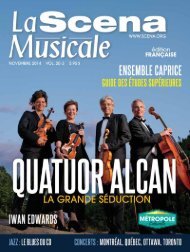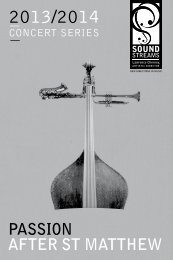Faces we
YbC7O
YbC7O
You also want an ePaper? Increase the reach of your titles
YUMPU automatically turns print PDFs into web optimized ePapers that Google loves.
Viewpoints<br />
Viewpoints<br />
Mount Pleasant’s<br />
future hangs in the<br />
ballot box balance<br />
The fabric of the<br />
neighbourhood may very<br />
<strong>we</strong>ll be determined by the<br />
provincial by-election<br />
By Megan Lau<br />
Photo courtesy City of Vancouver Archives<br />
Change is afoot in Mount Pleasant, the<br />
provincial riding I call home. It’s bound<br />
by Main Street to the <strong>we</strong>st, Commercial<br />
Drive on its eastern border, and Kingsway<br />
to the Burrard Inlet on its south and<br />
north ends, respectively. Mount Pleasant<br />
covers a swath of neighbourhoods that<br />
speak different languages, are mixed<br />
income, and are generally diverse in<br />
their needs, hopes, and challenges.<br />
Despite its diversity—or perhaps because<br />
of it—in recent history, Mount Pleasant<br />
is united politically. For almost 20 years,<br />
<strong>we</strong>’ve hardly needed to pay attention<br />
to provincial election results in Mount<br />
Pleasant. You could count on voters to<br />
choose BC NDP incumbent Jenny Kwan.<br />
Kwan was a perennial shoo-in for the<br />
legislative seat starting from her first<br />
election in 1996. Thanks to Kwan’s abilities<br />
and track record, Mount Pleasant is one<br />
the safest NDP seats in the province.<br />
In July, Kwan left her seat to run in<br />
last year’s federal election, and ever<br />
since Mount Pleasant has been without<br />
representation in “The Ledge.” The byelection<br />
will take place on Feb. 2 and there<br />
are three neophyte candidates in the race.<br />
The three candidates<br />
Last month, the Georgia Straight<br />
reported, “If conventional wisdom holds,<br />
New Democrat candidate Melanie Mark<br />
is in for a sure win in this traditional<br />
BC NDP bailiwick.” Mark is a former<br />
president of the Urban Native Youth<br />
Association, and worked in the office of<br />
B.C.’s representative for children and youth<br />
for eight years. She was also a critical force<br />
in bringing about changes in the way the<br />
police interact with Aboriginal peoples.<br />
The BC Liberals nominated Gavin<br />
Dew, a young candidate whose focus is<br />
on the relocation of St. Paul’s Hospital,<br />
improving transit, and growing the tech<br />
sector. His official biography notes, “He<br />
is running to make sure that people in<br />
Vancouver Mount Pleasant have the same<br />
opportunity to work hard, prosper, and lay<br />
a foundation for the next generation—the<br />
Canadian Dream.” With credentials from<br />
Harvard and those allusions to Manifest<br />
Destiny, Dew seems to be out of touch<br />
with most of Mount Pleasant’s residents.<br />
And finally, Pete Fry, Strathcona resident<br />
and small business owner, is the Green<br />
Party candidate. I like Fry’s communityfocused<br />
platform—addressing poverty<br />
reduction, climate change, and public<br />
housing. Fry made a run for city council<br />
in 2014, earning about 46,000 votes, and<br />
has served as chairman of the Strathcona<br />
Residents' Association. He’s advocated<br />
for his neighbourhood in the Local Area<br />
Planning Process and in dealings regarding<br />
the viaducts removal. When a man brutally<br />
sexually assaulted a Strathcona resident<br />
in her home last year, Fry was noted in<br />
the local media as leader in organizing the<br />
community to support the woman. On paper,<br />
Fry best represents progressive politics and<br />
a grassroots approach to social change.<br />
If <strong>we</strong> <strong>we</strong>re all informed and engaged<br />
voters, Fry could have a shot at winning. But<br />
our susceptibility to party politics means<br />
that it’s a race bet<strong>we</strong>en the Dems and the<br />
Libs. And I’m starting to feel that it hardly<br />
matters which one wins on a community<br />
level (I think it does matter, a lot, when<br />
it comes to your positions on LNG, our<br />
responsibility to children and youth in care,<br />
and public education). The NDP and Liberal<br />
candidates seem to be jockeying for their<br />
parties at the expense of the neighbourhood.<br />
With a provincial election coming up in<br />
less than two years, the by-election was<br />
a testing ground for campaign strategies<br />
in preparation for the real deal in 2017.<br />
An ever-changing horizon<br />
The thing is, with the pace and the degree<br />
of change happening in Vancouver, the<br />
most vulnerable in our community stand to<br />
lose a lot before the government changes.<br />
When I worked in Chinatown in 2014 and<br />
2015, I watched buildings disappear, and<br />
storefronts being boarded up, as if as<br />
quickly as a sped-up, time-lapse video—<br />
the transformation was so rapid. Mount<br />
Pleasant had the lo<strong>we</strong>st average income in<br />
B.C. and the highest proportion of lowincome<br />
single parents in 2006. Today,<br />
it’s the home of several craft bre<strong>we</strong>ries<br />
and countless market condos. Pushed out<br />
by high rents and housing prices, young<br />
families and upstarts have been moving<br />
east for years, bringing with them a taste for<br />
pressed juices, fixed-gear bicycles, and yoga.<br />
I bet it wouldn’t be hard to find a dozen<br />
Mount Pleasant residents on social media<br />
who are more than willing to pay $4 for a<br />
donut. Statements like that acknowledge<br />
there’s something wrong with the prices<br />
and that there’s some guilt involved. But it’s<br />
all said with a smirk and shrug—the online<br />
equivalent to knowingly turning a blind eye.<br />
I’m one of them<br />
As disapproving as I sound, by all<br />
measures, I was among the first of the<br />
gentrifiers. I moved into Mount Pleasant<br />
in 2011. I chose the neighbourhood for its<br />
affordability. It would bring me closer to<br />
my friends and work, and I could walk,<br />
bike or bus anywhere easily. I found a<br />
basement suite just east of Fraser Street<br />
and off the 10th Avenue bike path, and<br />
enjoyed cheap rent and a true sense of<br />
community. Politically, too, I felt at home in<br />
Mount Pleasant, where the riding’s voting<br />
record aligns with my personal values. I<br />
believe in protecting the environment.<br />
I believe in investing in social services<br />
and working towards justice and equality<br />
for all. I believe <strong>we</strong> should properly<br />
fund agencies that serve low-income<br />
people and people with addictions.<br />
But I’m also a middle-class, unattached<br />
professional who will be able to ride out<br />
the increases in rent and property values<br />
for a little while longer. When a new fancy<br />
restaurant replaces an old neighbourhood<br />
haunt, I can afford to try it and come<br />
back if I like it. When it’s cold and rainy,<br />
I have the luxury of considering flying<br />
somewhere warm for a vacation. Because<br />
I and people like me are attracted to<br />
Mount Pleasant, the most vulnerable<br />
in our population—particularly those<br />
living in Chinatown-Strathcona and the<br />
Downtown Eastside—could lose their<br />
homes, livelihoods and communities.<br />
The dynamics of Mount Pleasant aren’t<br />
unique in Vancouver, or the world, for that<br />
matter. Look at any neighbourhood around<br />
the world where communities of colour and<br />
low-income families live, and the stakes<br />
are the same: affordability and livability<br />
are eroding, and a sense of community<br />
is disappearing with it. Residents who<br />
have put down roots and contributed to<br />
the area’s social fabric are the ones who<br />
lose out in the process of gentrification.<br />
Who’s the right choice?<br />
In the by-election, there is a lot to<br />
consider. When it finally happens on Feb.<br />
2, I’m pessimistic that Mount Pleasant’s<br />
progressive colours will show with the same<br />
boldness they have for the last two decades.<br />
The hipsters are here, their corporate<br />
offices are next door, and upwardly mobile<br />
families have put down roots. Most don’t<br />
think about how Strathcona and Chinatown<br />
<strong>we</strong>re officially sanctioned ghettos for<br />
communities of diverse racial backgrounds;<br />
they can’t tell you how Main and Hastings<br />
has transformed in the last decade.<br />
Only the most facile conversations<br />
about gentrification are strictly against<br />
development. Change is often the result of<br />
the very basic need for housing and work,<br />
which is a factor for every resident of Mount<br />
Pleasant. Change is fine—but what kind<br />
and at what cost? I’d like Mount Pleasant to<br />
elect an MLA who supports progress that is<br />
enterprising, equitable and compassionate;<br />
someone who knows Chinatown, the<br />
Downtown Eastside, small business owners,<br />
the local Aboriginal community, the<br />
neighbourhood houses, and our history. But<br />
I don’t know who best fits that description.<br />
m This 1939 photo taken by W.J. Moore<br />
was snapped on city hall’s roof.<br />
Editor's note: BC NDP candidate Melanie<br />
Mark won the Mount Pleasant by-election.<br />
20<br />
Change that Works<br />
MegaphoneMagazine.com<br />
21





